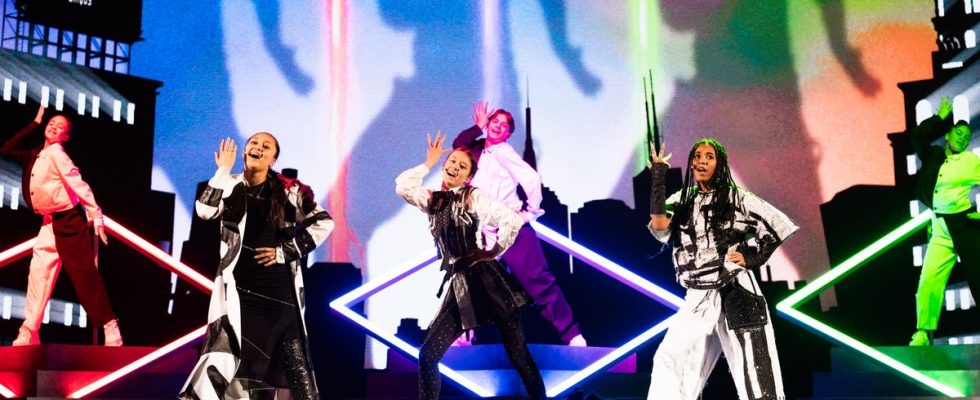This is an area where France outperforms but with immense discretion. Five Top 5s over the last five editions, including two victories in three years… It’s an understatement to say it, our country is on the rise at Junior Eurovision, the musical competition reserved for budding artists, from 9 to 14 years, derived from the Eurovision Song Contest.
The final of the 2023 edition will be held on Sunday, at the Palais Nikaia in Nice (Alpes-Maritimes), from 4 p.m., and broadcast live on France 2. France will be represented by Zoé Clauzure, who will sing Heart. “I gave my whole soul to this song. I tried to build, with my mother who helps me a lot on social networks, a building, stone by stone, which in the end will result in a very pretty tower. I would like to tell people to watch, because it’s worth it, there’s a lot of work behind it, it doesn’t happen in the blink of an eye, it’s going to be a magical moment,” proclaims the 13-year-old singer.
Child singers, a hindrance?
Is this enough to convince the general public to be there on France 2 from 4 p.m.? Because Junior Eurovision is traditionally broadcast on Sunday afternoon. A schedule, on paper, adapted to a family audience, but not really to the consumption habits of the small screen for such entertainment. The audiences of the last editions in which France participated – it made its return in 2018 – oscillate, on the second channel, between 979,000 (in 2019) and 1.6 million (in 2021, year when the competition was organized in Paris) people.
The argument according to which some viewers are reluctant to listen to child singers is only partially valid. If only by scrutinizing the audiences of The Voice Kids which, over the last five years, have hovered around 3 million on average on TF1. There is therefore an audience for this, which we must seek out.
“Today, Junior Eurovision has 33 million viewers worldwide. Why not 50 million in a few years? », Projects Alexandra Redde-Amiel, director of entertainment and games at France Télévisions. The one who is also head of delegation and executive producer of the 2023 edition insists on the fact that Junior Eurovision and Eurovision are “different challenges” with their own identities. “We have to grow the brand, that’s why we organize these press conferences, that we activate several levers to get people talking about the event. We need to digitalize more and more Junior to address everyone on the platforms and elsewhere. Today, it’s the meeting of traditional media, linear and digital,” explains Alexandra Redde-Amiel.
A hit on TikTok
France Télévisions is thus banking this year on a “digital ambassador” in the person of Ophenya, a 24-year-old influencer with 4 million subscribers on TikTok. On the social network popular with young people, the competition benefits from high visibility. Videos linked to the hashtags #jesc2023, #junioreurovision2023, #eurovisionjunior and #junioreurovision have already accumulated 32 million, 46.3 million, 100.2 million and 297 million views respectively. The challenge now is to shift the attention of TikTok users to the live broadcast of good old television on Sunday afternoon…
The big difference with Eurovision is also the number of participating countries. Where the cult musical competition brings together around thirty countries, the “children” version has never exceeded twenty entrants. This year, sixteen countries will be in the running. For Estonia, it will be a first, for Germany, a return, while Kazhakstan and Serbia, candidates in 2022, have decided to pass their turn.
The Scandinavian countries, Denmark, Norway and Sweden, although they initiated the creation of Junior in 2002, have not set foot there again for at least ten years. France itself took part in the second edition nineteen years ago and waited until 2018 to participate again. This decision demonstrated a paradigm shift on the part of France Télévisions, increasingly determined to win Eurovision, since Amir’s sixth place in 2016. Getting involved in the Junior is proof of good will, in somehow. “Junior Eurovision, for the moment, is very oriented towards Eastern countries. The EBU (European Broadcasting Union, which organizes the event) wants to make the program fresher,” confided to 20 minutesfive years ago, Edoardo Grassi, the head of delegation at the time.
Convince other countries to participate
“I would like there to be more participants,” Alexandra Redde-Amiel admits today. “It is the kindness in terms of the message sent to children that will convince other countries to compete,” she believes. If the competition only highlights the dramaturgy of votes, this will remain a hindrance. » It is this state of mind which pushed France Télévisions to choose “Heroes” as the theme for the Nice edition.
“I wanted something good vibes, continues the executive producer. A children’s competition is always difficult. There’s a first and a last, so we wanted to show them that no matter what, they are our heroes. There is a positive connotation. This is in addition to the work of the delegations who support the candidates and prepare them for all eventualities. We don’t let them go, we explain to them what could happen. »
Monday, during the opening ceremony at Negresco in Nice, the little artists were invited to talk about their dream superpowers. The answers were neither surprising nor revolutionary but reminded us that Junior Eurovision remains an event marked by candor with a… good-natured atmosphere.

